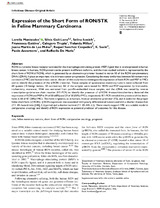Mostrar el registro sencillo del ítem
Expression of the Short Form of RON/STK in Feline Mammary Carcinoma
| dc.contributor.author | Maniscalco, Lorella | |
| dc.contributor.author | Guil-Luna, Silvia | |
| dc.contributor.author | Lussich, Selina | |
| dc.contributor.author | Gattino, Francesca | |
| dc.contributor.author | Trupia, Calogero | |
| dc.contributor.author | Millán, Yolanda | |
| dc.contributor.author | Martín de las Mulas González-Albo, Juana | |
| dc.contributor.author | Sánchez Céspedes, Raquel | |
| dc.contributor.author | Saeki, Kino | |
| dc.contributor.author | Accornero, Paolo | |
| dc.contributor.author | De María, Rafaella | |
| dc.date.accessioned | 2024-02-04T22:17:30Z | |
| dc.date.available | 2024-02-04T22:17:30Z | |
| dc.date.issued | 2019 | |
| dc.identifier.issn | 03009858 | |
| dc.identifier.uri | http://hdl.handle.net/10396/27071 | |
| dc.description.abstract | RON is a tyrosine kinase receptor activated by the macrophage-stimulating protein (MSP) ligand that is overexpressed in human breast cancer. In humans, RON protein can be present in different isoforms, and the most studied isoform is represented by the short form of RON (sf-RON), which is generated by an alternative promoter located in intron 10 of the RON complementary DNA (cDNA). It plays an important role in breast cancer progression. Considering the many similarities between feline mammary carcinoma (FMC) and human breast cancer, the aim of this study was to investigate the expression of both RON and MSP in FMCs and to identify the presence of the sf-RON transcript. Tissue samples of spontaneous mammary tumors were collected from 60 queens (10 benign lesions, 50 carcinomas). All of the samples were tested for RON and MSP expression by immunohistochemistry; moreover, RNA was extracted from paraffin-embedded tissue samples, and the cDNA was tested by reverse transcription–polymerase chain reaction (RT-PCR) to identify the presence of sf-RON. Immunohistochemistry detected the expression of RON and MSP in 34 of 50 (68%) and 29 of 50 (58%) FMCs, respectively. RT-PCR revealed the presence of the short-form in 18 of 47 (38%) FMCs. This form originates, as in humans, from an alternative promoter (P2), and it codes for the proper feline short form (sf-RON). sf-RON expression was associated with poorly differentiated tumors and with a shorter disease-free (P <.05; hazard ratio [HR], 2.2) period and a shorter survival | es_ES |
| dc.format.mimetype | application/pdf | es_ES |
| dc.language.iso | eng | es_ES |
| dc.publisher | Sage | es_ES |
| dc.rights | https://creativecommons.org/licenses/by-nc-nd/4.0/ | es_ES |
| dc.source | Maniscalco L, Guil-Luna S, Iussich S, et al. Expression of the Short Form of RON/STK in Feline Mammary Carcinoma. Veterinary Pathology. 2019;56(2):220-229. doi:10.1177/0300985818806967 | es_ES |
| dc.subject | Cats | es_ES |
| dc.subject | Feline mammary tumors | es_ES |
| dc.subject | Short form of RON | es_ES |
| dc.subject | Comparative oncology | es_ES |
| dc.subject | Prognosis | es_ES |
| dc.title | Expression of the Short Form of RON/STK in Feline Mammary Carcinoma | es_ES |
| dc.type | info:eu-repo/semantics/article | es_ES |
| dc.relation.publisherversion | http://dx.doi.org/10.1177/0300985818806967 | es_ES |
| dc.relation.projectID | Gobierno de España.AGL2011-25553 | es_ES |
| dc.rights.accessRights | info:eu-repo/semantics/openAccess | es_ES |

